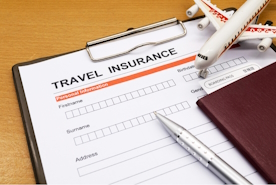
Call 0330 880 3600 Calls may be monitored or recorded. Opening Times.
- TRAVEL INSURANCE
- COVID-19 COVER
- More Options
- Help & Advice
- Existing Customers

Call 0330 880 3600 Calls may be monitored or recorded. Opening Times.

 When do I put my claim in?
When do I put my claim in?You should put your claim in as soon as is feasible. Some scenarios might require you to wait before you put in a claim, such as loss of baggage, whereas others like medical expenses can be placed or even paid out while in an emergency medical scenario.
In most Claims cases, it’s unlikely there would be an immediate payout, especially if there is another alternative involved. For example, if you booked your flight through Ryanair and the flight was cancelled, the Claims team would need you to confirm that you had exhausted all available options for reimbursement to confirm whether they can offer their own. This would mean contacting Ryanair and using the vouchers, overnight stay, or alternative flights they might offer.
However if the claim is due to an emergency medical incident there is every chance that once you have contacted the Medical Assistance team, they can take over and file the claim for you. In this situation, the sooner you contact them, the better.
The first people to call in a medical emergency is your emergency medical assistance team, whose information you can find in your Policy Wording. They are available 24/7 by phone, email, or post, and are a team of multilingual medical professionals who can help to settle your claim directly with the hospital or medical service provider.
If you are asked to pay a small bill for medicines or outpatient treatment while abroad, it’s usually easier to settle your medical bill there and then. You can then keep hold of all your receipts and make a claim for the costs incurred once you return to the United Kingdom.
If your treatment is more expensive, or if anyone on the policy is admitted as an inpatient, you must contact the emergency medical assistance team.
Travel insurance is designed to cover unexpected scenarios, and by purchasing a policy you are choosing this cover, whether the unexpected happens or not. You would not be able to cancel the policy if you have used it for the intended purpose.
We know it’s frustrating, but the short answer is that it’ll tell you in your Policy Wording. The section in the Wording could look something like this:
L. PERSONAL MONEY
If your personal money is lost or stolen while you are on your trip, we will reimburse you, up to the maximum benefit for ‘Personal Money’ shown in the ‘Cover Summary’.
| The following conditions apply: |
The following exclusions apply: |
|
You must:
a. have taken necessary steps to keep your personal money safe and to recover it; b. file and retain a copy of a police report in the case of theft; c. have filed and retained a copy of a report giving the details of the personal money and its value with the appropriate local authorities, travel carrier, hotel or tour operator within 24 hours of discovery of a loss; and d. provide documentary evidence of the value of the lost or stolen personal money as well as the original source for cash. |
1. This policy will not pay for personal money if one of the following apply: a. it is not being carried by you; b. it is not locked in the secure private accommodation you are using on your trip; or c. it is not locked in a safe or security deposit box. 2. Reimbursement, unless you can provide evidence of the amount of currency you had, from the place where you got the currency. 3. Losses caused by a drop in exchange rates or any shortage caused by mistakes made when exchanging currency. 4. Personal money left in a motor vehicle. 5. Loss or theft of traveller's cheques or other payment means if the issuing agent provides replacements or reimburses you. 6. More than the lowest market value of equivalent personal money (except cash), if paid for using frequent-flyer points, loyalty-card points, vouchers or another similar scheme. |
BY HOLLY GARWOOD, 22ND JULY 2024